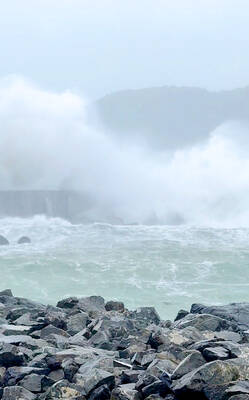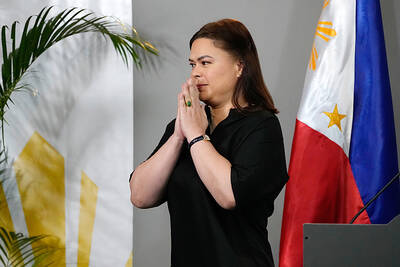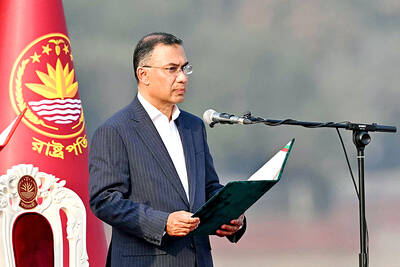US congressional aides who visited North Korea's nuclear plant said they have a lot of information to digest before they can say how far the secretive communist country has come in its nuclear weapons development, a senior South Korean official said.
Republican aide Keith Luse and Democratic colleague Frank Jannuzi, both staffers for the Senate Foreign Relations Committee, met with South Korean officials Monday to discuss last week's trip to the Yongbyon nuclear complex.
"They said they cannot say that anything was proven or verified during their trip," Wi Sung-lac, head of the South Korean foreign ministry's North American Affairs Bureau, said Monday.
"They said many things were unclear and they needed more discussions and analysis before coming to their own assessment."
The visit -- by five US delegates including Luse and Jannuzi -- was the first by outsiders since the North expelled UN inspectors in late 2002. The North said it showed the team its ``nuclear deterrent'' -- though what exactly they saw still has not been made public.
The delegates, including former Los Alamos Laboratory director Sig Hecker, held discussions with North Korean nuclear scientists, Vice Foreign Minister Kim Kye-gwan and Lieutenant General Ri Chan-bok, the North Korean military's point man at talks with the US-led UN Command in Seoul, Wi said.
"The North Koreans reiterated that they will freeze their nuclear activities only in return for compensation, and they expressed their willingness for dialogue," he said, quoting the congressional aides.
South Korea expected more information from the US delegates after they report to their superiors in Washington, Wi added.
Luse said more details would be made public at a Jan. 20 hearing of their Senate committee.
"We have had a full day of meeting with South Korean officials," Jannuzi said. "We hope that our visit here helps to continue the tradition of strong coordination between Washington and Seoul and contribute to the success of six-party talks."
Also Monday, North Korea's foreign ministry reiterated that the country was willing to freeze its nuclear activities at Yongbyon in return for oil supplies and economic aid from the US.
The US has demanded that the North begin dismantling its nuclear programs before receiving any concessions.
The crisis flared in Oct. 2002 when US officials accused North Korea of running a secret nuclear program in violation of a 1994 deal requiring the North to freeze its nuclear facilities. Washington and its allies cut off free oil shipments, also part of the 1994 accord.
North Korea responded by ejecting UN monitors and restarting a reactor at Yongbyon that generates spent fuel rods laced with plutonium.
Citing unnamed US officials, The Washington Post reported the US group had been shown recently reprocessed plutonium, the fuel for nuclear weapons. Luse and Jannuzi denied the report, Wi said.
The visit came as the US, China, Russia, Japan and the two Koreas are trying to arrange a new round of talks on ending the standoff over the North's nuclear program. A first round of six-nation talks ended in Beijing in August without much progress.

Heavy rain and strong winds yesterday disrupted flights, trains and ferries, forcing the closure of roads across large parts of New Zealand’s North Island, while snapping power links to tens of thousands. Domestic media reported a few flights had resumed operating by afternoon from the airport in Wellington, the capital, although cancelations were still widespread after airport authorities said most morning flights were disrupted. Air New Zealand said it hoped to resume services when conditions ease later yesterday, after it paused operations at Wellington, Napier and Palmerston North airports. Online images showed flooded semi-rural neighborhoods, inundated homes, trees fallen on vehicles and collapsed

‘COST OF DEFECTION’: Duterte’s announcement could be an effort to keep allies in line with the promise of a return to power amid political uncertainty, an analyst said Philippine Vice President Sara Duterte yesterday announced she would run for president of the Southeast Asian nation of 116 million in 2028. Duterte, who is embroiled in a bitter feud with Philippine President Ferdinand Marcos Jr, was impeached last year only to see the country’s Supreme Court throw the case out over procedural issues. Her announcement comes just days before her father, former Philippine president Rodrigo Duterte, begins a pretrial hearing at the International Criminal Court (ICC) in the Netherlands over crimes against humanity allegedly committed as part of a brutal crackdown on drugs. “I offer my life, my strength and my future

NOT YET THERE: While the show was impressive, it failed to demonstrate their ability to move in unstructured environments, such as a factory floor, an expert said Dancing humanoid robots on Monday took center stage during the annual China Media Group’s Spring Festival Gala, China’s most-watched official television broadcast. They lunged and backflipped (landing on their knees), they spun around and jumped. Not one fell over. The display was impressive, but if robots can now dance and perform martial arts, what else can they do? Experts have mixed opinions, with some saying the robots had limitations and that the display should be viewed through a lens of state propaganda. Developed by several Chinese robotics firms, the robots performed a range of intricate stunts, including martial arts, comedy sketches and choreographed

POST-UPRISING: Bangladesh Nationalist Party lawmakers were yesterday expected to formally elect Tarique Rahman as their leader and new head of government Bangladesh’s prime minister-to-be Tarique Rahman and lawmakers were yesterday sworn into parliament, becoming the first elected representatives since a deadly 2024 uprising. Rahman is set to take over from an interim government that has steered the country of 170 million people for 18 months since the autocratic government of Sheikh Hasina was overthrown. The lawmakers, who promised loyalty to Bangladesh, were sworn in by Chief Election Commissioner AMM Nasir Uddin. Bangladesh Nationalist Party (BNP) lawmakers are expected to formally elect Rahman as their leader, with President Mohammed Shahabuddin then to administer the oath of office to the prime minister and his ministers